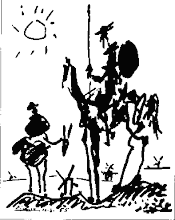The accused Canadian pedophile, Christopher Paul Neil is under arrest in distant Thailand and the world heaves a collective sigh of relief, ...and of satisfaction. The series of global tips that led to his identification and capture was uniquely swift and oddly gratifying.
The element of the story that generated a sense of fulfillment was that it was not just our cops but our neighbours that got this man. Although it was the techies in blue who unscrambled the image on the wanted poster, once the offending organism was identified, a kind of world-wide moral immune system seemed to be triggered. It reacted swiftly and summarily across cyberspace to locate and reject this nasty piece of infection from the body corporate. The universal and pan-cultural human revulsion was amazing to behold and his capture seemed deeply fulfilling for all of us. Our global message to Mr. Neil and his ilk is that we're not standing for any of this perversion in our neighbourhood, -and our neighbourhood is pretty damn big.
All of which demonstrates the wonderful quality of accountability on the net.
For all the superficial anonymity of silly chat room names, it is becoming better understood by all of us that the net is a goldfish bowl. From the Mr. Neils of this world to e-bay feedback and the unmasking, (or unbooting) of police provocateurs on youtube, someone, somewhere, with very little technical ability and a little motivation, can not only find out what you've been up to, they're in a position to share it with the rest of us . Which makes the digital world a very big small town.
I happen to think that’s a good thing.
This brings to mind the matter of cameras in public places. I'm all for them. The more, the merrier I say, but the condition is that they cannot be piped into some windowless security office or police station. No, all public cameras must be simply that: public. They can be beamed on to the net where we can all watch each other just like friends and neighbours do in small towns everywhere. Yes, there are risks of some misunderstandings, but we long ago developed fairly effective mechanisms to protect ourselves from the excesses of the more fanatical neighbourhood watchers.
I grew up on a street where it was understood, (and not infrequently demonstrated,) that there might be watchful eyes behind nearby curtains. Although the prospect of accountability for every minor childhood offence might have rankled, the presence of a 'little bird' who might tell was a constant and important reminder that we lived in, and were answerable to a wider community. What little discomfort such an environment might have engendered was dramatically offset by the sense that, to a vulnerable young person, it felt and was in fact, much safer than areas that were out of sight of my community.
There is a huge difference between the external, Orwellian control of an unfettered Big Brother and the constructive self control of an engaged, informed and empowered community. Thanks in no small measure to our new digital neighbourhood, Mr. Neil may have a considerable amount of time on his hands to ponder such distinctions.
Saturday, October 20, 2007
Friday, October 19, 2007
The Two Stories of Residential Schools
Our local museum is working with survivors and their families on an upcoming exhibit dealing with Indian Residential Schools. It’s about time. Their tragic experience needs telling to the broadest possible public. But it seems to me that there are two tales in the Residential School saga… there is the terrible story of the victims and their families but there is also an important story behind the actions of the perpetrators.
Folks who specialize in such things generally agree that in order to avoid the repetition of crimes, offenders should be encouraged to understand the nature and implications of their offences. They should also understand the underlying motivation behind their offences. With the understanding of their impact they can experience true remorse for the harm that they have done to others. With the understanding of their own deeper motivations they can recognize the patterns of wrong thinking and bad behaviour that led to the offence and they can equip themselves to avoid similar patterns and conditions in the future.
 The Indian Residential Schools were morally and, too frequently, criminally offensive and yet, so far as I have seen, the perpetrators, (which is to say every one of us who is not a victim,) have not yet been called upon to examine the underlying thought processes that led to the original offence. What kind of pretzel logic, what sort of twisted rationalizations led a group of professedly “caring people” to believe that they had the right to take away other peoples’ children? What philosophy, what beliefs led to this cruelly destructive form of cultural arrogance? It seems to me that these are important questions that should be explored in any retrospective look at this terrible period. If the fundamental assumptions and motivations behind the offence are not exposed and addressed then there is a danger that the behaviour will be repeated into the future.
The Indian Residential Schools were morally and, too frequently, criminally offensive and yet, so far as I have seen, the perpetrators, (which is to say every one of us who is not a victim,) have not yet been called upon to examine the underlying thought processes that led to the original offence. What kind of pretzel logic, what sort of twisted rationalizations led a group of professedly “caring people” to believe that they had the right to take away other peoples’ children? What philosophy, what beliefs led to this cruelly destructive form of cultural arrogance? It seems to me that these are important questions that should be explored in any retrospective look at this terrible period. If the fundamental assumptions and motivations behind the offence are not exposed and addressed then there is a danger that the behaviour will be repeated into the future.
In short, I figure that any meaningful enquiry into the residential schools should include a deeper exploration of the beliefs and the rationalizations behind their creation. It’s a very important story and it too needs widespread public exposure.
My fear is that the same patterns of thinking, the same sort of cultural arrogance that brought us Indian Residential Schools is still very much at work in the world. It can sometimes be glimpsed behind the eyes of folks selling Coca Cola in Calcutta and “democracy” at the point of a gun.
Folks who specialize in such things generally agree that in order to avoid the repetition of crimes, offenders should be encouraged to understand the nature and implications of their offences. They should also understand the underlying motivation behind their offences. With the understanding of their impact they can experience true remorse for the harm that they have done to others. With the understanding of their own deeper motivations they can recognize the patterns of wrong thinking and bad behaviour that led to the offence and they can equip themselves to avoid similar patterns and conditions in the future.
 The Indian Residential Schools were morally and, too frequently, criminally offensive and yet, so far as I have seen, the perpetrators, (which is to say every one of us who is not a victim,) have not yet been called upon to examine the underlying thought processes that led to the original offence. What kind of pretzel logic, what sort of twisted rationalizations led a group of professedly “caring people” to believe that they had the right to take away other peoples’ children? What philosophy, what beliefs led to this cruelly destructive form of cultural arrogance? It seems to me that these are important questions that should be explored in any retrospective look at this terrible period. If the fundamental assumptions and motivations behind the offence are not exposed and addressed then there is a danger that the behaviour will be repeated into the future.
The Indian Residential Schools were morally and, too frequently, criminally offensive and yet, so far as I have seen, the perpetrators, (which is to say every one of us who is not a victim,) have not yet been called upon to examine the underlying thought processes that led to the original offence. What kind of pretzel logic, what sort of twisted rationalizations led a group of professedly “caring people” to believe that they had the right to take away other peoples’ children? What philosophy, what beliefs led to this cruelly destructive form of cultural arrogance? It seems to me that these are important questions that should be explored in any retrospective look at this terrible period. If the fundamental assumptions and motivations behind the offence are not exposed and addressed then there is a danger that the behaviour will be repeated into the future.In short, I figure that any meaningful enquiry into the residential schools should include a deeper exploration of the beliefs and the rationalizations behind their creation. It’s a very important story and it too needs widespread public exposure.
My fear is that the same patterns of thinking, the same sort of cultural arrogance that brought us Indian Residential Schools is still very much at work in the world. It can sometimes be glimpsed behind the eyes of folks selling Coca Cola in Calcutta and “democracy” at the point of a gun.
Stay tuned
October 19th, 2007: a step into cyberspace and an immediate retreat. Actually not a retreat; reality presses in and I must haste away. Like McArthur, I shall return..... well, maybe that's a bad example.
-later.
-later.
Subscribe to:
Comments (Atom)

